“I married once again after I’d been exonerated with restoration of rank and the Order of Lenin I was awarded in 1936 for excellent drilling of the brigade personnel. We divorced in 1942. There was no issue. Now I’m single…”
My brother’s wife Ekaterina Vasilievna, at whose place I was living, told me as if snapping: “Don’t be stupid! Who else is going to be interested in you, a cripple? He loves you, pities you, protects you, helps you. You can see he’s a good man. Marry him, Annoushka, and forget, or rather try to forget, all your memories… You need to live!”
And then the war came to an end. I still remember sitting in my home on the Arbat and crying… After all, I was still under investigation, they were checking on me! We had no wedding as such in the way they are celebrated nowadays. We signed up at the Kiev District Registry Office in Moscow, and then had dinner in the restaurant of the ‘Moscow’ Hotel where Timofeev lived. Then we were given places in a sanatorium on the seashore in the Caucasus, and we spent nearly a month there. Upon our return to Moscow we decided to go and see my mum in the village of Volodovo. Mum was so happy then, so joyful, and during those days I didn’t know I was seeing her for the last time in my life…
My husband’s holiday was nearly over, he had to go back to Germany, and I decided to spend some time at mum’s place. He left, but returned three days later in a light vehicle and took me away with him. I had no pass, and we flew over to Warsaw in several hops. From there General Polynin provided us with a U-2 two-seater. The pilot was in the front cockpit, we squeezed ourselves into the back one — and off we flew like that. Near the Oder river the engine stalled, we ran out of fuel, and the young pilot lost his head and sent the plane over a woodland reserve. Fortunately, we still had some altitude. With lightning speed, my husband leaned towards the pilot, snatched the control column from his hands and managed to turn the plane away from the forest. We landed on a field jolting (the plane was now jumping up and now falling down having lost speed), but the colonel had lost his Air Force peaked cap in the air. We looked for it in the field and in the bushes for quite some time. All that happened not far from Frankfurt-an-der-Oder. The pilot stayed by the plane and we headed towards the city on foot. The local commandant gave us a vehicle and by night we had safely arrived in Cottbus, at my husband’s duty station.
37. Where are you now? My regimental comrades
In Germany, in the city of Cottbus, despite all the doctors’ prohibitions, I gave birth to a son whom we called Petr. After the delivery I was sick for a long time, couldn’t walk — apparently my unsuccessful landing with the parachute that had failed to fully open had taken its toll. In Cottbus Professor Molitor warned me — I had spinal injuries in the sacrum area. I was happy about one thing: the boy was healthy.
In a year my husband was called to Moscow and we headed for the Soviet Union by train. In Moscow, in the Air Force Personnel Department Timofeev was offered a General’s position, as Commander of the Aviation Corps in… Kamchatka. He said that he couldn’t move there because of his wife’s illness. “We can’t offer you anything else!” the head of the Personnel Department cut him off. A medical examination followed, my husband had wounds from the time of the Civil War — and we both became pensioners. I was a disabled ex-serviceman, and he had become a pensioner per ‘order #100’.
We had no place to live, and with difficulty we settled in the outskirts of Moscow, in Obukhovo near Monino: we wanted to hear the roar of planes’ engines if nothing else… In Obukhovo I gave birth to another son — Igor — and again ‘unauthorized’. I say ‘unauthorized’ for the doctors had banned me form bearing children most strictly. But I hadn’t turned to them any more, right up until the delivery. Before giving birth to Igor I had taken fright and requested admittance to the maternity hospital of the town of Elektrostal: its doctors saved both me and my child. I also have to thank Kalistov, the Director of the 12th Plant, who obtained some medication for me from the 4th Central Medical Board with which the 12th Plant was in partnership…
I had no communications with my regimental comrades: our 805th Order of Suvorov Berlin Ground Attack Regiment 177 177 Editor’s note — where Order of Suvorov stands for the unit award (as was the practice) and Berlin is an honorary title.
had been disbanded.
And then one day, not believing my eyes, I saw two Captains in Air Force uniform in front of me. They were Andrey Konyakhin and Leva Kabisher. My God, there was so much talk, so much news! It appeared that when our regiment had been disbanded many airmen had stayed in service. Konyakhin, Kabisher, Makarenko, Tarnovskiy, Mazetov found themselves in the Moscow Military District. Their unit took part in aerial parades and major manoeuvers.
“And how is Makarenko?” I kept questioning my comrades.
“He’s alright. He married Katya — an instrument mechanic. Do you remember her — she served in our 3rd Squadron — a serious girl? By the way, during your last sortie, when we were flying onto the bridgehead across the Vistula, Makarenko seemed to see something white, similar to a parachute just above the ground near the target. Our guys got it hard then! Karev was shot up and barely landed on an island in the middle of the Vistula river, south of Warsaw. That evening he turned up with his gunner right in Meljanuw for our festivities — the Air Force Day celebrations. But that celebration was a very sad one. I remember the Comsomol deputy of the Division Political Department showing your leather gloves that you’d thrown to him before the sortie. He had invited you then for the first dance in the manor-house that evening. You thanked him, threw him the gloves and said: “It’s gonna be hot today…”
That day from Andrey Konyakhin and Leva Kabisher I found out about the death of several comrades-in-arms whose fate I had not known. Pavel Evteev — our regimental singer and bayan player had met his death — the regiment was bereft without his songs, without his warm-hearted music. And his regimental comrades would keep Pasha’s bayan for quite some time after that, carefully carrying it from one aerodrome to another…
“Well, and how are things between you and the Party?” my friends asked me after all the stories. “We’ve heard you managed to save your Party membership card.”
“Yes, I did. But it was taken away from me in our Division Political Department when I returned from the camp. I’d been in captivity for five months, and, of course, no membership fees had been paid for those months. Some instructor took away my card from me and gave me a reference instead. I gather the card was sent to the Central Political Department without being cancelled.”
“And what about Dyachenko, the head of the political department — was he present during this ‘procedure’?”
“No, he wasn’t. He wasn’t in the department then. He had no time to deal with that matter — he was taking his ‘honeymoon’ with a typist from the department”, Konyakhin entered the conversation. “He’d become totally shameless! He’d left a wife and three kids in the Ukraine, and here he was courting…”
“Well, what happened then with your Party business? Tell us.”
“Listen to me and I will…
Upon arrival in Moscow I applied with that reference to the Central Political Department of the Soviet Army. They didn’t find my Party membership card there and recommended looking for it in the Political Departments of different branches of the forces, including the Air Force. I wrote lots of letters and finally found my Party membership card in the Moscow Garrison Depots and Construction Political Department, somewhere near the Manège 178 178 Translator’s note — the former riding school of the Tsars in the centre of Moscow.
. I came and showed the reference given to me in the Political Department of the 197th Ground Attack Aviation Division. They received me politely and amicably. I was in military uniform with Senior Lieutenant’s shoulder boards, my decorations and my walking stick…
Читать дальше












